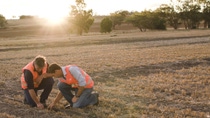Tamworth's sustainable CropSolutions

At BASF, we want to contribute to a world that provides a viable future with an enhanced quality of life for everyone. No initiative is considered too small when it comes to encouraging sustainable farming practices, and at our CropSolutions farm in Tamworth, NSW, the research team is proving that indeed, from little things, big things grow. The mission is to trial new crop protection products developed by the global experts at BASF. This includes working with new herbicides, fungicides, insecticides, and biological control solutions, thus gaining a greater understanding of cost effective, yet sustainable, farming practices. The research conducted uses global knowledge, fine-tuned in Australia, and aims to provide Aussie farmers with the tools needed to encourage larger and better-quality yields, whilst using less resources.
With the challenges presented by Australia’s changing climate, it is important to the team that they maximise water use efficiency across all operations of the farm, ensuring they offset the effects that rising temperatures and rainfall deficits will have on the crops. They undertake several initiatives, one of which is cover cropping. In between trial crops, a variety of mixed species cover crops are planted which aim to capture rainfall, reduce evaporation, increase soil microbial activity, and increase organic matter within the soil.
“The cover crop phase serves a number of purposes. Bare paddocks are prone to higher evaporation and reduced soil microbial activity due to a reduction in moisture and available food for the microbes. We’re not putting the system on pause, we are instead keeping it actively going,” explained Russell Ison, Field Biologist & CropSolutions Farm Manager at BASF ANZ.
Rather than leaving the area bare in between trials, cover cropping ensures constant microbial activity within the soil, which promotes carbon sequestration and increases rainfall infiltration to avoid erosion through reduced run-off. This season, a mixture of cereals, brassicas and legumes will be planted to improve soil tilth and cycle nutrients. The cover crops also include flowering plants, selected to help attract and harbor the two bee populations that settle in the northern and southern boundaries of the farm.
Maintaining biodiversity is important to the team as it directly supports sustainable agriculture systems by promoting soil fertility, pollination, and Integrated Pest Management. Protocols are therefore followed to minimise disturbance to the bee populations. Part of BASFs strategy is to develop products that have low toxicology ratings, and therefore present no impact to residing species, which is why the team also record any effects on beneficial insects.
Biodiversity is also promoted throughout the riparian zone, which runs through the farm connecting a corridor of trees along the main road to another by the river, therefore acting as a buffer zone and habitat for native animals. Within this area, native species grow freely, as the team elect not to use pesticides in this area, encouraging natural growth. Weeds within the zone are mechanically managed, however native plants are left to grow naturally and are managed through timely slashing methods. Slashing encourages growth within the zone and adds biomass to the soil, which increases soil organic matter, carbon content, and habitat availability for lizards and small mammals.
A system for the disposal of chemicals released via the washing of machinery has also been devised by the team at Tamworth, which aims to minimise and remove waste in an environmentally friendly manner. The residue from the mixing and washing of equipment is collected and passed through an oil separator, which removes any oil-based products. The water then enters their anaerobic septic system, where any excess is sprayed out onto a small dedicated area of the farm, which is then naturally broken down via microbial activity. Waste is also reduced through their composting initiative, where excess potting mix from the glasshouse trials is composted alongside food scraps, and then used as a natural fertiliser in the riparian zone.
The future development of sustainable farming practices is very exciting, and the team consisting of Russell and Georgia at Tamworth are very happy to play their part. “We have the opportunity to contribute as we are a research farm, and we’re very mindful of the fact that we can provide examples not only for other farmers, but for BASF”, said Russell. We look forward to following the team’s journey towards a more sustainable agriculture sector, and their future contributions to the industry.